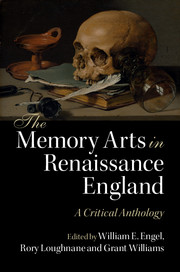PART I - The art of memory
Published online by Cambridge University Press: 05 August 2016
Summary
I hold opinion with an ancient captain of Athens, who being asked if he took not pleasure to learn the art of memory: ‘no, rather’, sayeth he, ‘I delight in the art of forgetfulness’, because, in his judgement, he preserved well all things in his mind, which, being learned, he forgot not. But above all, if a thing once engraved in us cannot be defaced without great pain; love only once rooted in our hearts is most hardly, yea impossible, drawn from us by any human art or policy.…
Etienne Pasquier, Monophylo, trans. Sir Geoffrey Fenton (1572), Q3v–4rCyrus, therefore King of Persia, and Mithridates, King of Pontus, were both much honoured and much esteemed of their soldiers: Cyrus for his skill and art of memory, for he could name all the soldiers in his army; and Mithridates for his knowledge of tongues, for he could speak two and twenty languages to all those nations that served under him.
James Godskall, The Ark of Noah (1604), D3v…'tis a childish triumph to boast of a great memory; besides that it is a thing of shame and disgrace to make a show of great reading, exposing a great fare of words without doors, when the house within is altogether unfurnished.
Heinrich Cornelius Agrippa, The Vanity of Arts and Sciences (1676; first printed 1526), D8v–E1r- Type
- Chapter
- Information
- The Memory Arts in Renaissance EnglandA Critical Anthology, pp. 33 - 34Publisher: Cambridge University PressPrint publication year: 2016

